Commercial Role of Ethical Standards: A Business Perspective Essay
VerifiedAdded on 2022/11/12
|10
|2307
|462
Essay
AI Summary
This essay examines the commercial implications of ethical standards, focusing on an Australian employee survey conducted in 2018. The analysis explores the impact of ethical practices on a company's sustainable growth and employability, comparing ethical understandings across different sectors and employee demographics. The study delves into the role of codes of ethics in guiding employee decision-making and enhancing a company's market standing. It highlights key findings from the survey, including differences in ethical perceptions based on gender, age, sector (private vs. public), and organization size. The essay further investigates the ethical standards within the accounting industry in Australia, emphasizing the principles of integrity and objectivity. It concludes that a strong understanding and implementation of ethical practices positively influence an organization's employability, job security, and overall reputation, thereby contributing to sustainable growth and stakeholder trust.
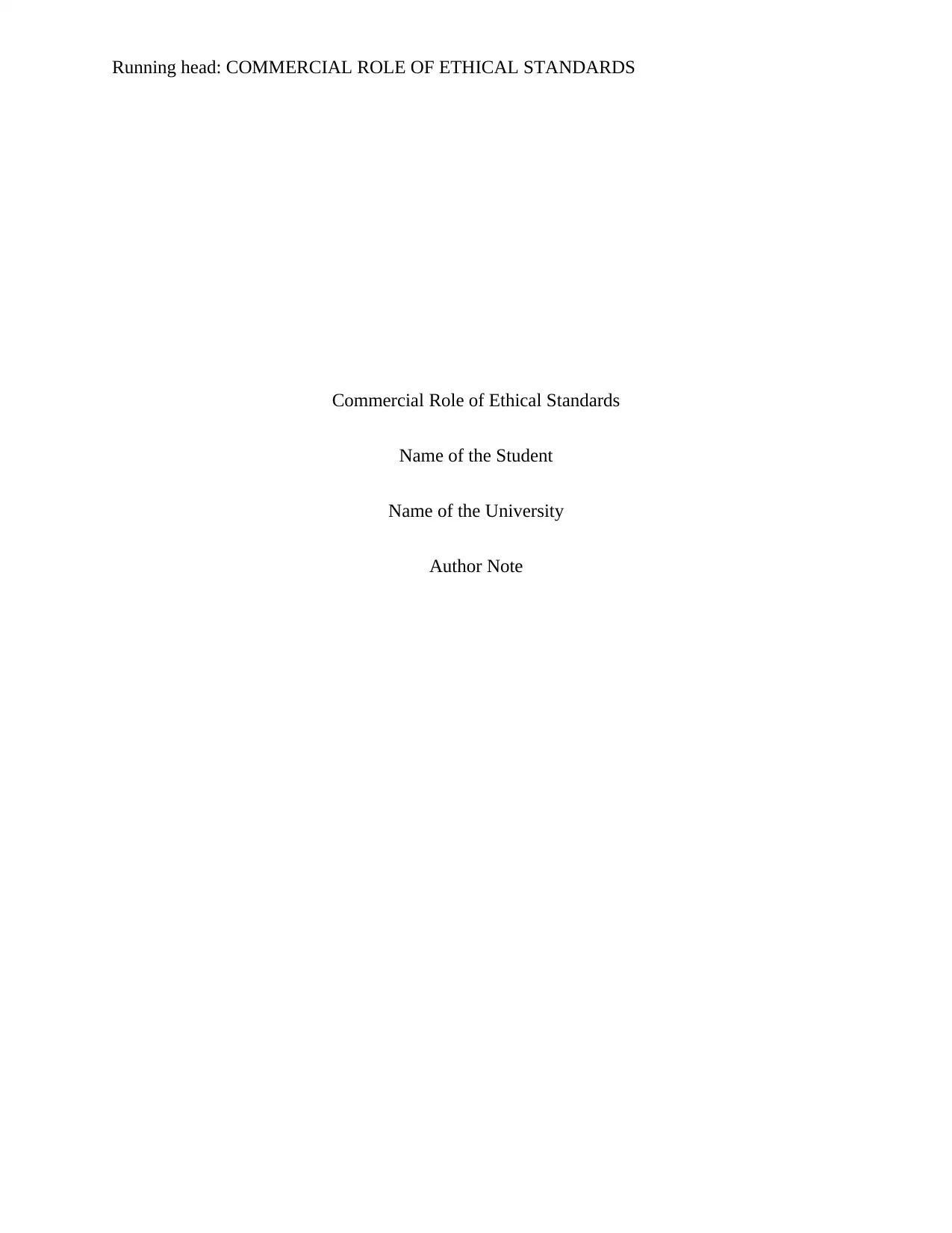
Running head: COMMERCIAL ROLE OF ETHICAL STANDARDS
Commercial Role of Ethical Standards
Name of the Student
Name of the University
Author Note
Commercial Role of Ethical Standards
Name of the Student
Name of the University
Author Note
Paraphrase This Document
Need a fresh take? Get an instant paraphrase of this document with our AI Paraphraser
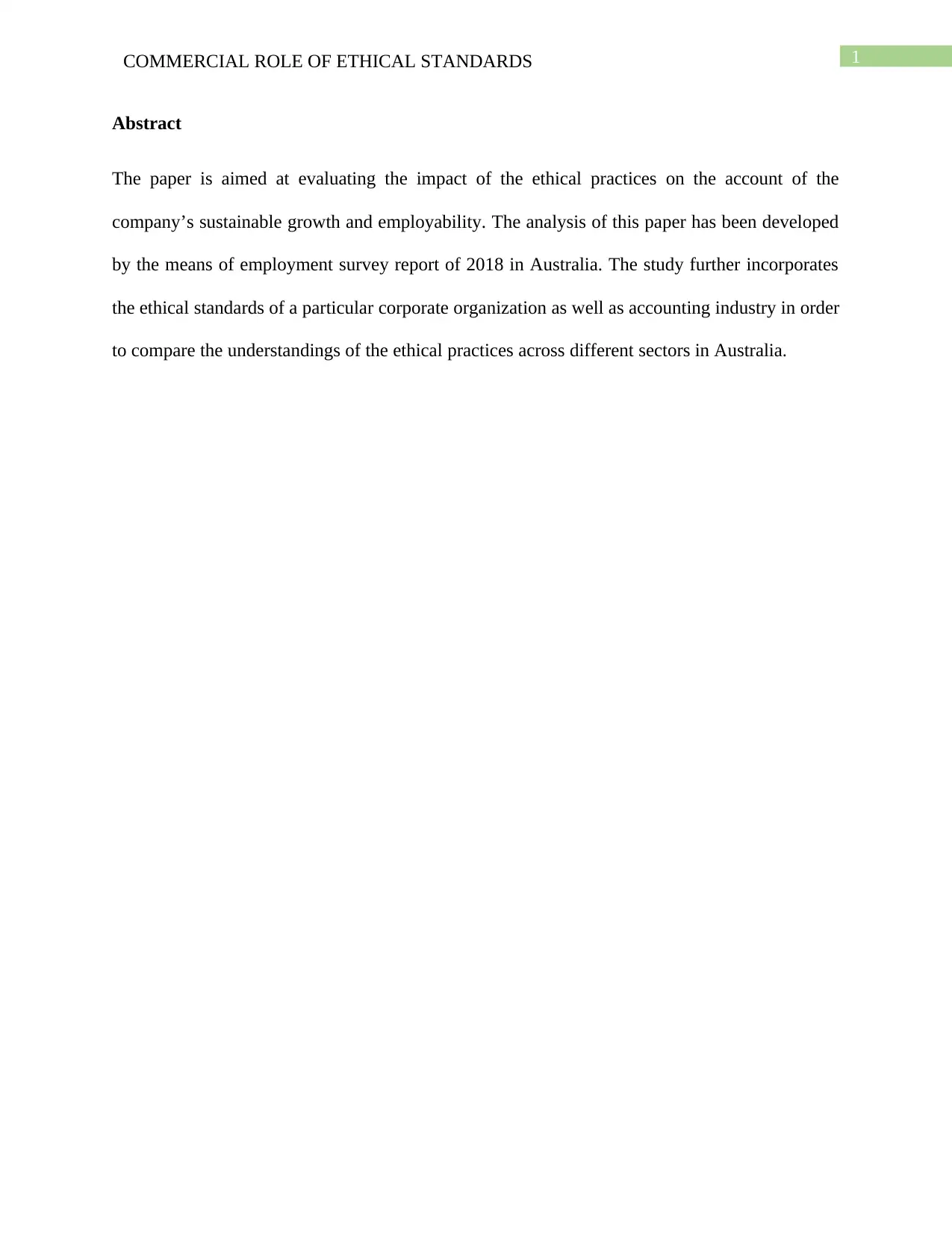
1COMMERCIAL ROLE OF ETHICAL STANDARDS
Abstract
The paper is aimed at evaluating the impact of the ethical practices on the account of the
company’s sustainable growth and employability. The analysis of this paper has been developed
by the means of employment survey report of 2018 in Australia. The study further incorporates
the ethical standards of a particular corporate organization as well as accounting industry in order
to compare the understandings of the ethical practices across different sectors in Australia.
Abstract
The paper is aimed at evaluating the impact of the ethical practices on the account of the
company’s sustainable growth and employability. The analysis of this paper has been developed
by the means of employment survey report of 2018 in Australia. The study further incorporates
the ethical standards of a particular corporate organization as well as accounting industry in order
to compare the understandings of the ethical practices across different sectors in Australia.
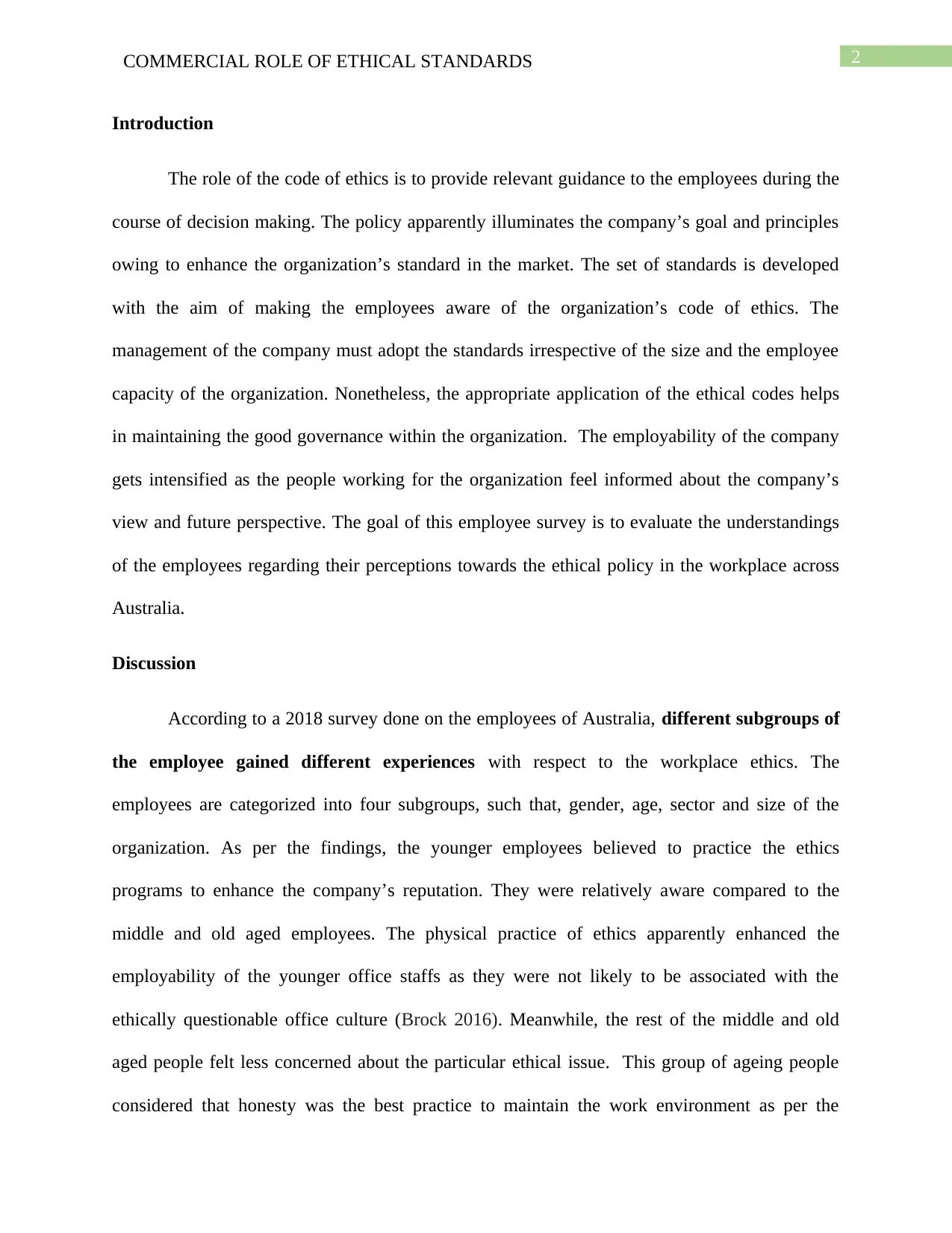
2COMMERCIAL ROLE OF ETHICAL STANDARDS
Introduction
The role of the code of ethics is to provide relevant guidance to the employees during the
course of decision making. The policy apparently illuminates the company’s goal and principles
owing to enhance the organization’s standard in the market. The set of standards is developed
with the aim of making the employees aware of the organization’s code of ethics. The
management of the company must adopt the standards irrespective of the size and the employee
capacity of the organization. Nonetheless, the appropriate application of the ethical codes helps
in maintaining the good governance within the organization. The employability of the company
gets intensified as the people working for the organization feel informed about the company’s
view and future perspective. The goal of this employee survey is to evaluate the understandings
of the employees regarding their perceptions towards the ethical policy in the workplace across
Australia.
Discussion
According to a 2018 survey done on the employees of Australia, different subgroups of
the employee gained different experiences with respect to the workplace ethics. The
employees are categorized into four subgroups, such that, gender, age, sector and size of the
organization. As per the findings, the younger employees believed to practice the ethics
programs to enhance the company’s reputation. They were relatively aware compared to the
middle and old aged employees. The physical practice of ethics apparently enhanced the
employability of the younger office staffs as they were not likely to be associated with the
ethically questionable office culture (Brock 2016). Meanwhile, the rest of the middle and old
aged people felt less concerned about the particular ethical issue. This group of ageing people
considered that honesty was the best practice to maintain the work environment as per the
Introduction
The role of the code of ethics is to provide relevant guidance to the employees during the
course of decision making. The policy apparently illuminates the company’s goal and principles
owing to enhance the organization’s standard in the market. The set of standards is developed
with the aim of making the employees aware of the organization’s code of ethics. The
management of the company must adopt the standards irrespective of the size and the employee
capacity of the organization. Nonetheless, the appropriate application of the ethical codes helps
in maintaining the good governance within the organization. The employability of the company
gets intensified as the people working for the organization feel informed about the company’s
view and future perspective. The goal of this employee survey is to evaluate the understandings
of the employees regarding their perceptions towards the ethical policy in the workplace across
Australia.
Discussion
According to a 2018 survey done on the employees of Australia, different subgroups of
the employee gained different experiences with respect to the workplace ethics. The
employees are categorized into four subgroups, such that, gender, age, sector and size of the
organization. As per the findings, the younger employees believed to practice the ethics
programs to enhance the company’s reputation. They were relatively aware compared to the
middle and old aged employees. The physical practice of ethics apparently enhanced the
employability of the younger office staffs as they were not likely to be associated with the
ethically questionable office culture (Brock 2016). Meanwhile, the rest of the middle and old
aged people felt less concerned about the particular ethical issue. This group of ageing people
considered that honesty was the best practice to maintain the work environment as per the
⊘ This is a preview!⊘
Do you want full access?
Subscribe today to unlock all pages.

Trusted by 1+ million students worldwide
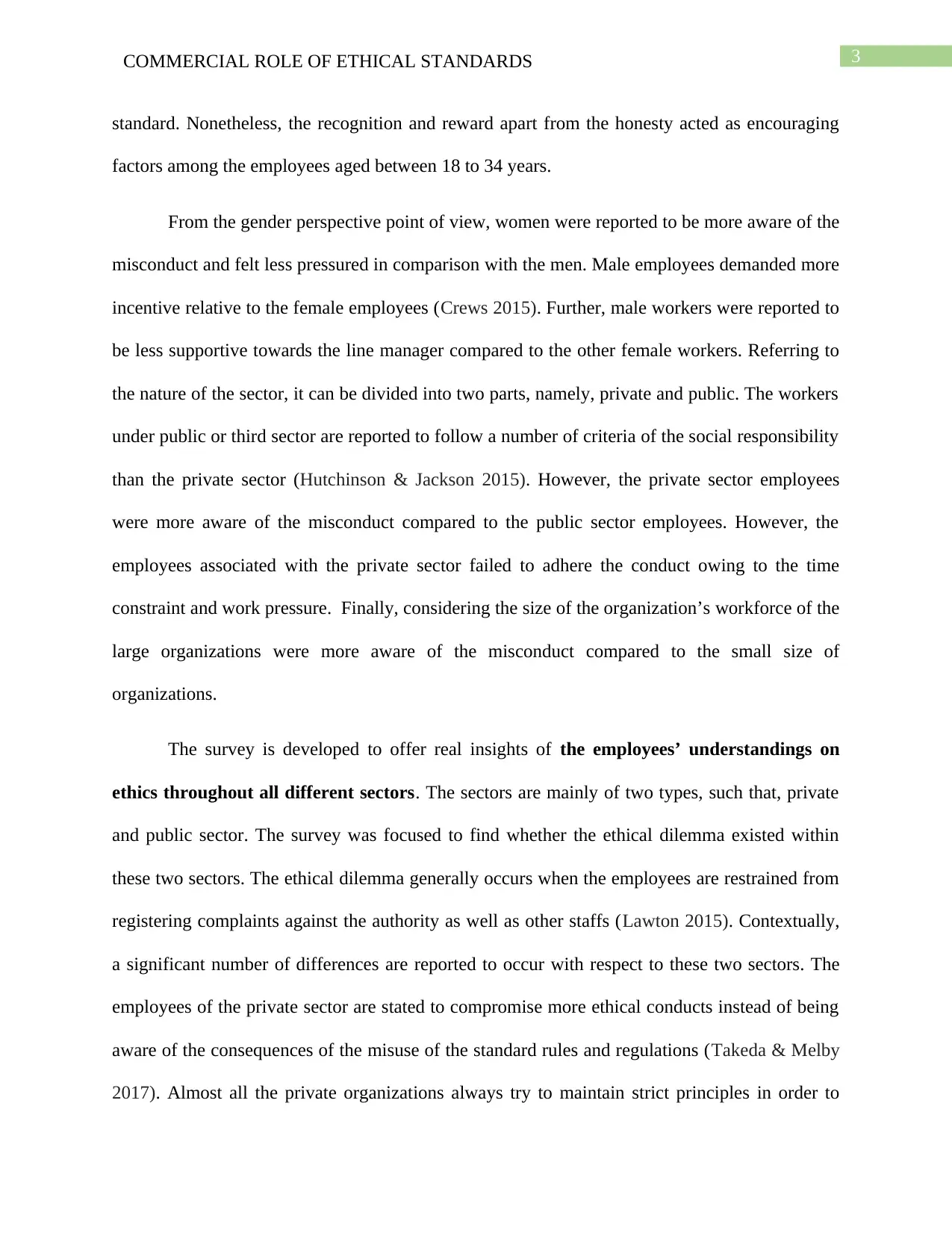
3COMMERCIAL ROLE OF ETHICAL STANDARDS
standard. Nonetheless, the recognition and reward apart from the honesty acted as encouraging
factors among the employees aged between 18 to 34 years.
From the gender perspective point of view, women were reported to be more aware of the
misconduct and felt less pressured in comparison with the men. Male employees demanded more
incentive relative to the female employees (Crews 2015). Further, male workers were reported to
be less supportive towards the line manager compared to the other female workers. Referring to
the nature of the sector, it can be divided into two parts, namely, private and public. The workers
under public or third sector are reported to follow a number of criteria of the social responsibility
than the private sector (Hutchinson & Jackson 2015). However, the private sector employees
were more aware of the misconduct compared to the public sector employees. However, the
employees associated with the private sector failed to adhere the conduct owing to the time
constraint and work pressure. Finally, considering the size of the organization’s workforce of the
large organizations were more aware of the misconduct compared to the small size of
organizations.
The survey is developed to offer real insights of the employees’ understandings on
ethics throughout all different sectors. The sectors are mainly of two types, such that, private
and public sector. The survey was focused to find whether the ethical dilemma existed within
these two sectors. The ethical dilemma generally occurs when the employees are restrained from
registering complaints against the authority as well as other staffs (Lawton 2015). Contextually,
a significant number of differences are reported to occur with respect to these two sectors. The
employees of the private sector are stated to compromise more ethical conducts instead of being
aware of the consequences of the misuse of the standard rules and regulations (Takeda & Melby
2017). Almost all the private organizations always try to maintain strict principles in order to
standard. Nonetheless, the recognition and reward apart from the honesty acted as encouraging
factors among the employees aged between 18 to 34 years.
From the gender perspective point of view, women were reported to be more aware of the
misconduct and felt less pressured in comparison with the men. Male employees demanded more
incentive relative to the female employees (Crews 2015). Further, male workers were reported to
be less supportive towards the line manager compared to the other female workers. Referring to
the nature of the sector, it can be divided into two parts, namely, private and public. The workers
under public or third sector are reported to follow a number of criteria of the social responsibility
than the private sector (Hutchinson & Jackson 2015). However, the private sector employees
were more aware of the misconduct compared to the public sector employees. However, the
employees associated with the private sector failed to adhere the conduct owing to the time
constraint and work pressure. Finally, considering the size of the organization’s workforce of the
large organizations were more aware of the misconduct compared to the small size of
organizations.
The survey is developed to offer real insights of the employees’ understandings on
ethics throughout all different sectors. The sectors are mainly of two types, such that, private
and public sector. The survey was focused to find whether the ethical dilemma existed within
these two sectors. The ethical dilemma generally occurs when the employees are restrained from
registering complaints against the authority as well as other staffs (Lawton 2015). Contextually,
a significant number of differences are reported to occur with respect to these two sectors. The
employees of the private sector are stated to compromise more ethical conducts instead of being
aware of the consequences of the misuse of the standard rules and regulations (Takeda & Melby
2017). Almost all the private organizations always try to maintain strict principles in order to
Paraphrase This Document
Need a fresh take? Get an instant paraphrase of this document with our AI Paraphraser
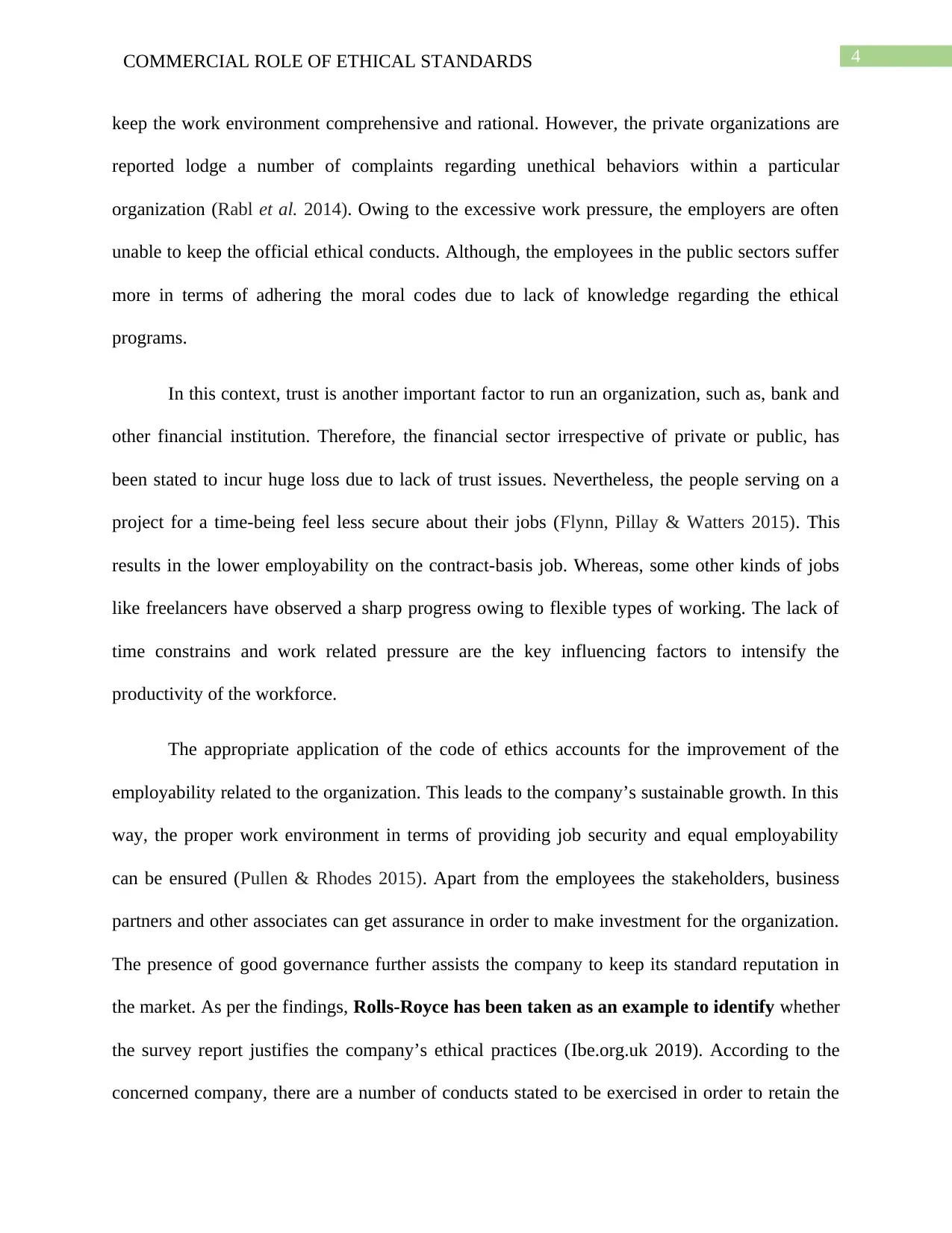
4COMMERCIAL ROLE OF ETHICAL STANDARDS
keep the work environment comprehensive and rational. However, the private organizations are
reported lodge a number of complaints regarding unethical behaviors within a particular
organization (Rabl et al. 2014). Owing to the excessive work pressure, the employers are often
unable to keep the official ethical conducts. Although, the employees in the public sectors suffer
more in terms of adhering the moral codes due to lack of knowledge regarding the ethical
programs.
In this context, trust is another important factor to run an organization, such as, bank and
other financial institution. Therefore, the financial sector irrespective of private or public, has
been stated to incur huge loss due to lack of trust issues. Nevertheless, the people serving on a
project for a time-being feel less secure about their jobs (Flynn, Pillay & Watters 2015). This
results in the lower employability on the contract-basis job. Whereas, some other kinds of jobs
like freelancers have observed a sharp progress owing to flexible types of working. The lack of
time constrains and work related pressure are the key influencing factors to intensify the
productivity of the workforce.
The appropriate application of the code of ethics accounts for the improvement of the
employability related to the organization. This leads to the company’s sustainable growth. In this
way, the proper work environment in terms of providing job security and equal employability
can be ensured (Pullen & Rhodes 2015). Apart from the employees the stakeholders, business
partners and other associates can get assurance in order to make investment for the organization.
The presence of good governance further assists the company to keep its standard reputation in
the market. As per the findings, Rolls-Royce has been taken as an example to identify whether
the survey report justifies the company’s ethical practices (Ibe.org.uk 2019). According to the
concerned company, there are a number of conducts stated to be exercised in order to retain the
keep the work environment comprehensive and rational. However, the private organizations are
reported lodge a number of complaints regarding unethical behaviors within a particular
organization (Rabl et al. 2014). Owing to the excessive work pressure, the employers are often
unable to keep the official ethical conducts. Although, the employees in the public sectors suffer
more in terms of adhering the moral codes due to lack of knowledge regarding the ethical
programs.
In this context, trust is another important factor to run an organization, such as, bank and
other financial institution. Therefore, the financial sector irrespective of private or public, has
been stated to incur huge loss due to lack of trust issues. Nevertheless, the people serving on a
project for a time-being feel less secure about their jobs (Flynn, Pillay & Watters 2015). This
results in the lower employability on the contract-basis job. Whereas, some other kinds of jobs
like freelancers have observed a sharp progress owing to flexible types of working. The lack of
time constrains and work related pressure are the key influencing factors to intensify the
productivity of the workforce.
The appropriate application of the code of ethics accounts for the improvement of the
employability related to the organization. This leads to the company’s sustainable growth. In this
way, the proper work environment in terms of providing job security and equal employability
can be ensured (Pullen & Rhodes 2015). Apart from the employees the stakeholders, business
partners and other associates can get assurance in order to make investment for the organization.
The presence of good governance further assists the company to keep its standard reputation in
the market. As per the findings, Rolls-Royce has been taken as an example to identify whether
the survey report justifies the company’s ethical practices (Ibe.org.uk 2019). According to the
concerned company, there are a number of conducts stated to be exercised in order to retain the
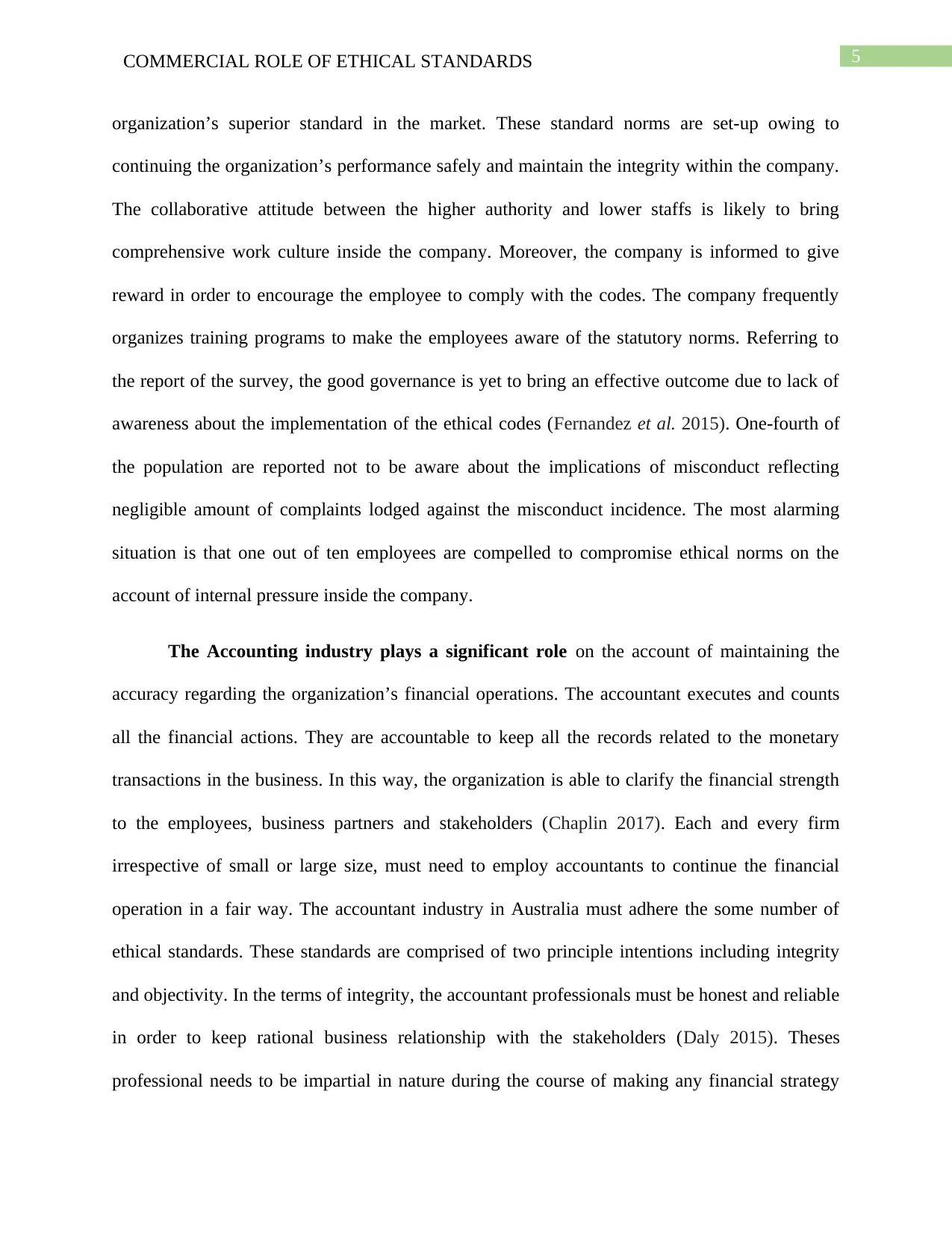
5COMMERCIAL ROLE OF ETHICAL STANDARDS
organization’s superior standard in the market. These standard norms are set-up owing to
continuing the organization’s performance safely and maintain the integrity within the company.
The collaborative attitude between the higher authority and lower staffs is likely to bring
comprehensive work culture inside the company. Moreover, the company is informed to give
reward in order to encourage the employee to comply with the codes. The company frequently
organizes training programs to make the employees aware of the statutory norms. Referring to
the report of the survey, the good governance is yet to bring an effective outcome due to lack of
awareness about the implementation of the ethical codes (Fernandez et al. 2015). One-fourth of
the population are reported not to be aware about the implications of misconduct reflecting
negligible amount of complaints lodged against the misconduct incidence. The most alarming
situation is that one out of ten employees are compelled to compromise ethical norms on the
account of internal pressure inside the company.
The Accounting industry plays a significant role on the account of maintaining the
accuracy regarding the organization’s financial operations. The accountant executes and counts
all the financial actions. They are accountable to keep all the records related to the monetary
transactions in the business. In this way, the organization is able to clarify the financial strength
to the employees, business partners and stakeholders (Chaplin 2017). Each and every firm
irrespective of small or large size, must need to employ accountants to continue the financial
operation in a fair way. The accountant industry in Australia must adhere the some number of
ethical standards. These standards are comprised of two principle intentions including integrity
and objectivity. In the terms of integrity, the accountant professionals must be honest and reliable
in order to keep rational business relationship with the stakeholders (Daly 2015). Theses
professional needs to be impartial in nature during the course of making any financial strategy
organization’s superior standard in the market. These standard norms are set-up owing to
continuing the organization’s performance safely and maintain the integrity within the company.
The collaborative attitude between the higher authority and lower staffs is likely to bring
comprehensive work culture inside the company. Moreover, the company is informed to give
reward in order to encourage the employee to comply with the codes. The company frequently
organizes training programs to make the employees aware of the statutory norms. Referring to
the report of the survey, the good governance is yet to bring an effective outcome due to lack of
awareness about the implementation of the ethical codes (Fernandez et al. 2015). One-fourth of
the population are reported not to be aware about the implications of misconduct reflecting
negligible amount of complaints lodged against the misconduct incidence. The most alarming
situation is that one out of ten employees are compelled to compromise ethical norms on the
account of internal pressure inside the company.
The Accounting industry plays a significant role on the account of maintaining the
accuracy regarding the organization’s financial operations. The accountant executes and counts
all the financial actions. They are accountable to keep all the records related to the monetary
transactions in the business. In this way, the organization is able to clarify the financial strength
to the employees, business partners and stakeholders (Chaplin 2017). Each and every firm
irrespective of small or large size, must need to employ accountants to continue the financial
operation in a fair way. The accountant industry in Australia must adhere the some number of
ethical standards. These standards are comprised of two principle intentions including integrity
and objectivity. In the terms of integrity, the accountant professionals must be honest and reliable
in order to keep rational business relationship with the stakeholders (Daly 2015). Theses
professional needs to be impartial in nature during the course of making any financial strategy
⊘ This is a preview!⊘
Do you want full access?
Subscribe today to unlock all pages.

Trusted by 1+ million students worldwide
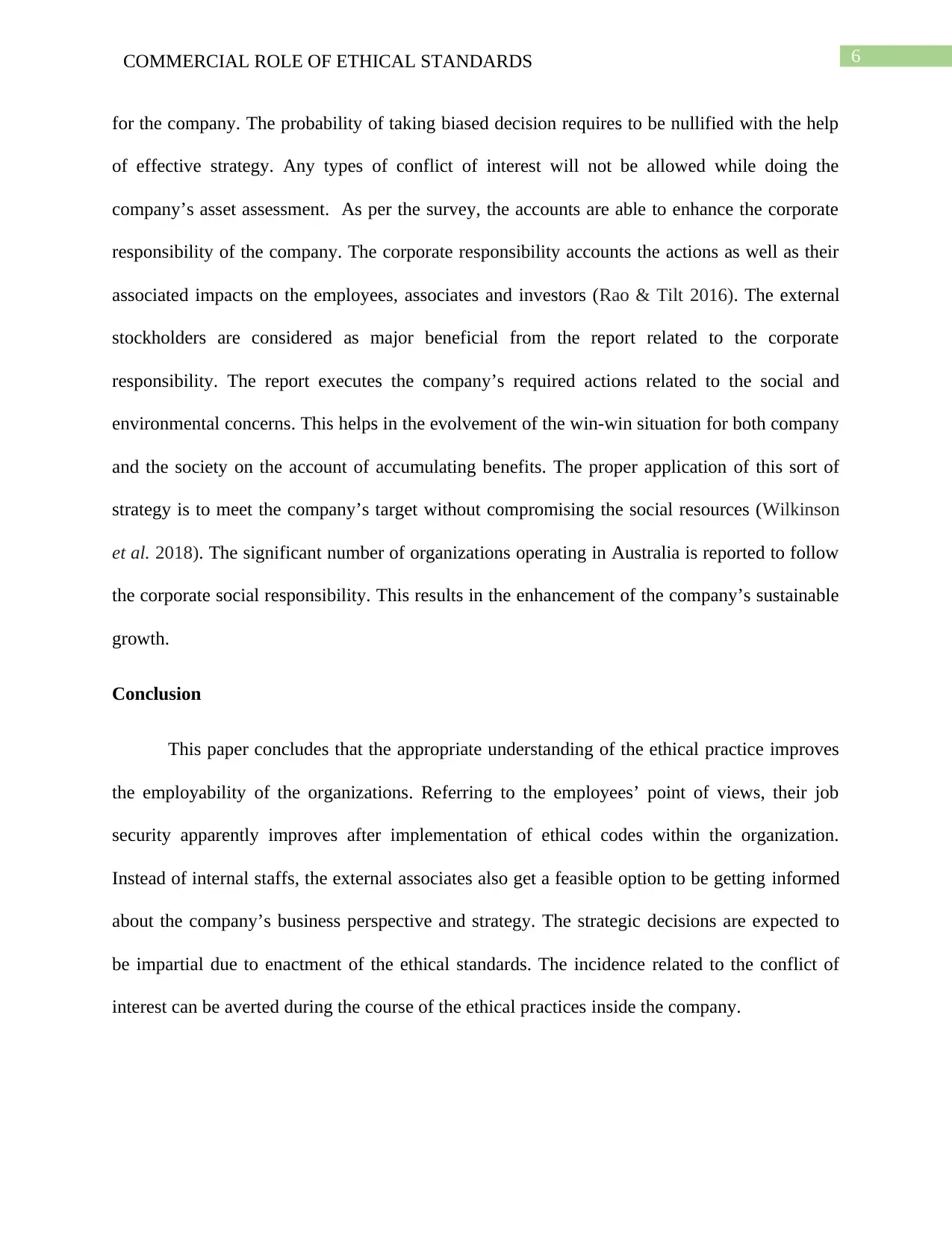
6COMMERCIAL ROLE OF ETHICAL STANDARDS
for the company. The probability of taking biased decision requires to be nullified with the help
of effective strategy. Any types of conflict of interest will not be allowed while doing the
company’s asset assessment. As per the survey, the accounts are able to enhance the corporate
responsibility of the company. The corporate responsibility accounts the actions as well as their
associated impacts on the employees, associates and investors (Rao & Tilt 2016). The external
stockholders are considered as major beneficial from the report related to the corporate
responsibility. The report executes the company’s required actions related to the social and
environmental concerns. This helps in the evolvement of the win-win situation for both company
and the society on the account of accumulating benefits. The proper application of this sort of
strategy is to meet the company’s target without compromising the social resources (Wilkinson
et al. 2018). The significant number of organizations operating in Australia is reported to follow
the corporate social responsibility. This results in the enhancement of the company’s sustainable
growth.
Conclusion
This paper concludes that the appropriate understanding of the ethical practice improves
the employability of the organizations. Referring to the employees’ point of views, their job
security apparently improves after implementation of ethical codes within the organization.
Instead of internal staffs, the external associates also get a feasible option to be getting informed
about the company’s business perspective and strategy. The strategic decisions are expected to
be impartial due to enactment of the ethical standards. The incidence related to the conflict of
interest can be averted during the course of the ethical practices inside the company.
for the company. The probability of taking biased decision requires to be nullified with the help
of effective strategy. Any types of conflict of interest will not be allowed while doing the
company’s asset assessment. As per the survey, the accounts are able to enhance the corporate
responsibility of the company. The corporate responsibility accounts the actions as well as their
associated impacts on the employees, associates and investors (Rao & Tilt 2016). The external
stockholders are considered as major beneficial from the report related to the corporate
responsibility. The report executes the company’s required actions related to the social and
environmental concerns. This helps in the evolvement of the win-win situation for both company
and the society on the account of accumulating benefits. The proper application of this sort of
strategy is to meet the company’s target without compromising the social resources (Wilkinson
et al. 2018). The significant number of organizations operating in Australia is reported to follow
the corporate social responsibility. This results in the enhancement of the company’s sustainable
growth.
Conclusion
This paper concludes that the appropriate understanding of the ethical practice improves
the employability of the organizations. Referring to the employees’ point of views, their job
security apparently improves after implementation of ethical codes within the organization.
Instead of internal staffs, the external associates also get a feasible option to be getting informed
about the company’s business perspective and strategy. The strategic decisions are expected to
be impartial due to enactment of the ethical standards. The incidence related to the conflict of
interest can be averted during the course of the ethical practices inside the company.
Paraphrase This Document
Need a fresh take? Get an instant paraphrase of this document with our AI Paraphraser
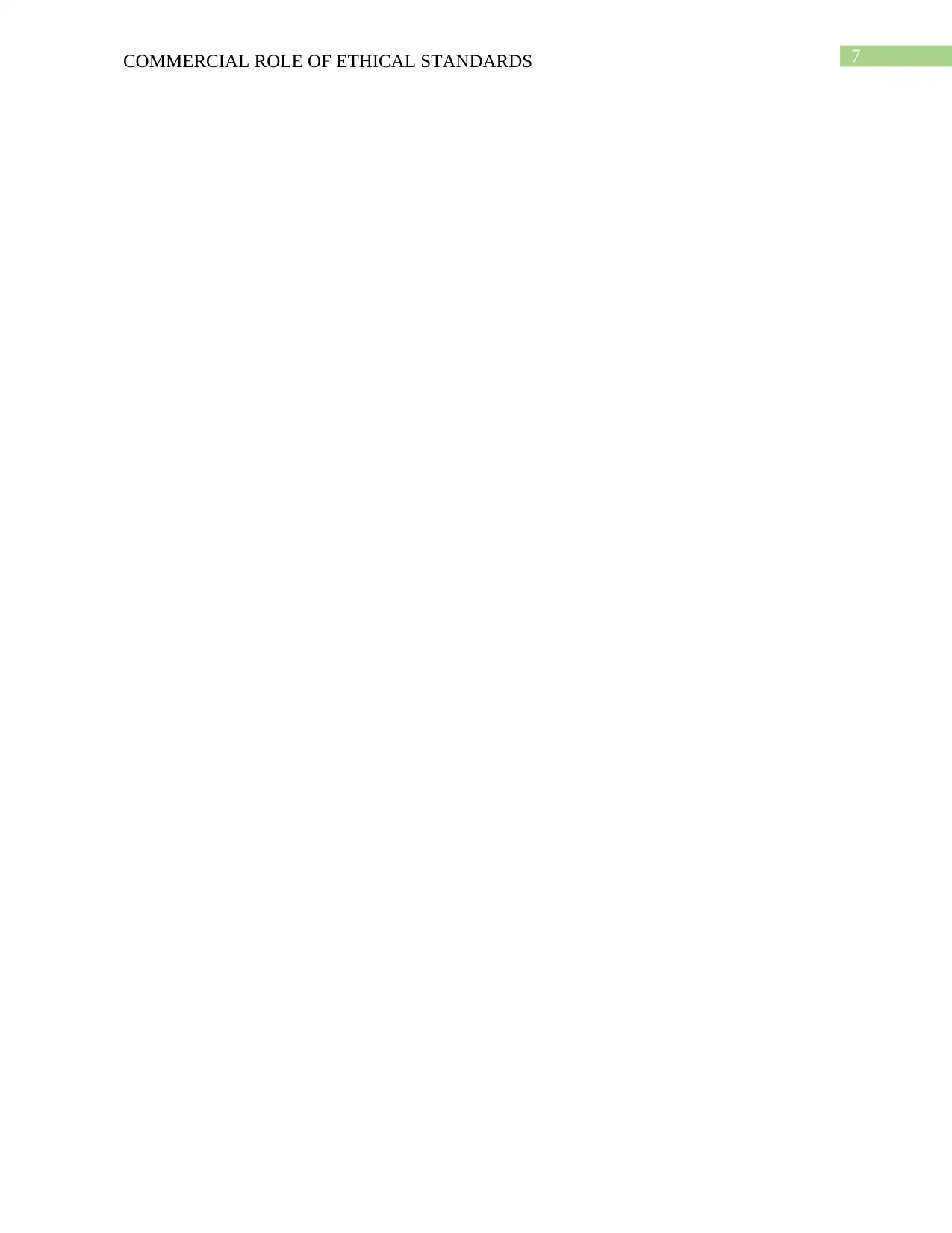
7COMMERCIAL ROLE OF ETHICAL STANDARDS
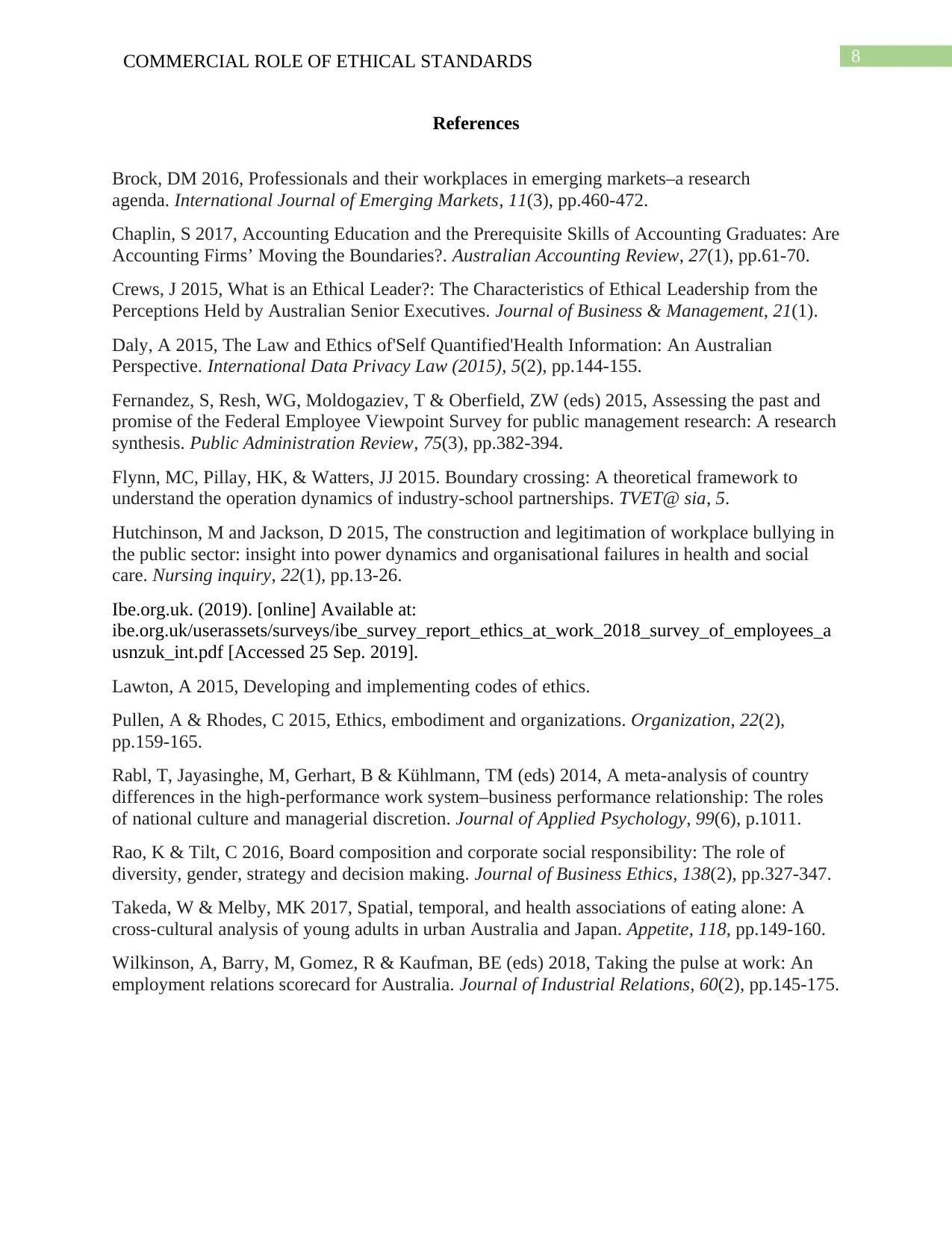
8COMMERCIAL ROLE OF ETHICAL STANDARDS
References
Brock, DM 2016, Professionals and their workplaces in emerging markets–a research
agenda. International Journal of Emerging Markets, 11(3), pp.460-472.
Chaplin, S 2017, Accounting Education and the Prerequisite Skills of Accounting Graduates: Are
Accounting Firms’ Moving the Boundaries?. Australian Accounting Review, 27(1), pp.61-70.
Crews, J 2015, What is an Ethical Leader?: The Characteristics of Ethical Leadership from the
Perceptions Held by Australian Senior Executives. Journal of Business & Management, 21(1).
Daly, A 2015, The Law and Ethics of'Self Quantified'Health Information: An Australian
Perspective. International Data Privacy Law (2015), 5(2), pp.144-155.
Fernandez, S, Resh, WG, Moldogaziev, T & Oberfield, ZW (eds) 2015, Assessing the past and
promise of the Federal Employee Viewpoint Survey for public management research: A research
synthesis. Public Administration Review, 75(3), pp.382-394.
Flynn, MC, Pillay, HK, & Watters, JJ 2015. Boundary crossing: A theoretical framework to
understand the operation dynamics of industry-school partnerships. TVET@ sia, 5.
Hutchinson, M and Jackson, D 2015, The construction and legitimation of workplace bullying in
the public sector: insight into power dynamics and organisational failures in health and social
care. Nursing inquiry, 22(1), pp.13-26.
Ibe.org.uk. (2019). [online] Available at:
ibe.org.uk/userassets/surveys/ibe_survey_report_ethics_at_work_2018_survey_of_employees_a
usnzuk_int.pdf [Accessed 25 Sep. 2019].
Lawton, A 2015, Developing and implementing codes of ethics.
Pullen, A & Rhodes, C 2015, Ethics, embodiment and organizations. Organization, 22(2),
pp.159-165.
Rabl, T, Jayasinghe, M, Gerhart, B & Kühlmann, TM (eds) 2014, A meta-analysis of country
differences in the high-performance work system–business performance relationship: The roles
of national culture and managerial discretion. Journal of Applied Psychology, 99(6), p.1011.
Rao, K & Tilt, C 2016, Board composition and corporate social responsibility: The role of
diversity, gender, strategy and decision making. Journal of Business Ethics, 138(2), pp.327-347.
Takeda, W & Melby, MK 2017, Spatial, temporal, and health associations of eating alone: A
cross-cultural analysis of young adults in urban Australia and Japan. Appetite, 118, pp.149-160.
Wilkinson, A, Barry, M, Gomez, R & Kaufman, BE (eds) 2018, Taking the pulse at work: An
employment relations scorecard for Australia. Journal of Industrial Relations, 60(2), pp.145-175.
References
Brock, DM 2016, Professionals and their workplaces in emerging markets–a research
agenda. International Journal of Emerging Markets, 11(3), pp.460-472.
Chaplin, S 2017, Accounting Education and the Prerequisite Skills of Accounting Graduates: Are
Accounting Firms’ Moving the Boundaries?. Australian Accounting Review, 27(1), pp.61-70.
Crews, J 2015, What is an Ethical Leader?: The Characteristics of Ethical Leadership from the
Perceptions Held by Australian Senior Executives. Journal of Business & Management, 21(1).
Daly, A 2015, The Law and Ethics of'Self Quantified'Health Information: An Australian
Perspective. International Data Privacy Law (2015), 5(2), pp.144-155.
Fernandez, S, Resh, WG, Moldogaziev, T & Oberfield, ZW (eds) 2015, Assessing the past and
promise of the Federal Employee Viewpoint Survey for public management research: A research
synthesis. Public Administration Review, 75(3), pp.382-394.
Flynn, MC, Pillay, HK, & Watters, JJ 2015. Boundary crossing: A theoretical framework to
understand the operation dynamics of industry-school partnerships. TVET@ sia, 5.
Hutchinson, M and Jackson, D 2015, The construction and legitimation of workplace bullying in
the public sector: insight into power dynamics and organisational failures in health and social
care. Nursing inquiry, 22(1), pp.13-26.
Ibe.org.uk. (2019). [online] Available at:
ibe.org.uk/userassets/surveys/ibe_survey_report_ethics_at_work_2018_survey_of_employees_a
usnzuk_int.pdf [Accessed 25 Sep. 2019].
Lawton, A 2015, Developing and implementing codes of ethics.
Pullen, A & Rhodes, C 2015, Ethics, embodiment and organizations. Organization, 22(2),
pp.159-165.
Rabl, T, Jayasinghe, M, Gerhart, B & Kühlmann, TM (eds) 2014, A meta-analysis of country
differences in the high-performance work system–business performance relationship: The roles
of national culture and managerial discretion. Journal of Applied Psychology, 99(6), p.1011.
Rao, K & Tilt, C 2016, Board composition and corporate social responsibility: The role of
diversity, gender, strategy and decision making. Journal of Business Ethics, 138(2), pp.327-347.
Takeda, W & Melby, MK 2017, Spatial, temporal, and health associations of eating alone: A
cross-cultural analysis of young adults in urban Australia and Japan. Appetite, 118, pp.149-160.
Wilkinson, A, Barry, M, Gomez, R & Kaufman, BE (eds) 2018, Taking the pulse at work: An
employment relations scorecard for Australia. Journal of Industrial Relations, 60(2), pp.145-175.
⊘ This is a preview!⊘
Do you want full access?
Subscribe today to unlock all pages.

Trusted by 1+ million students worldwide
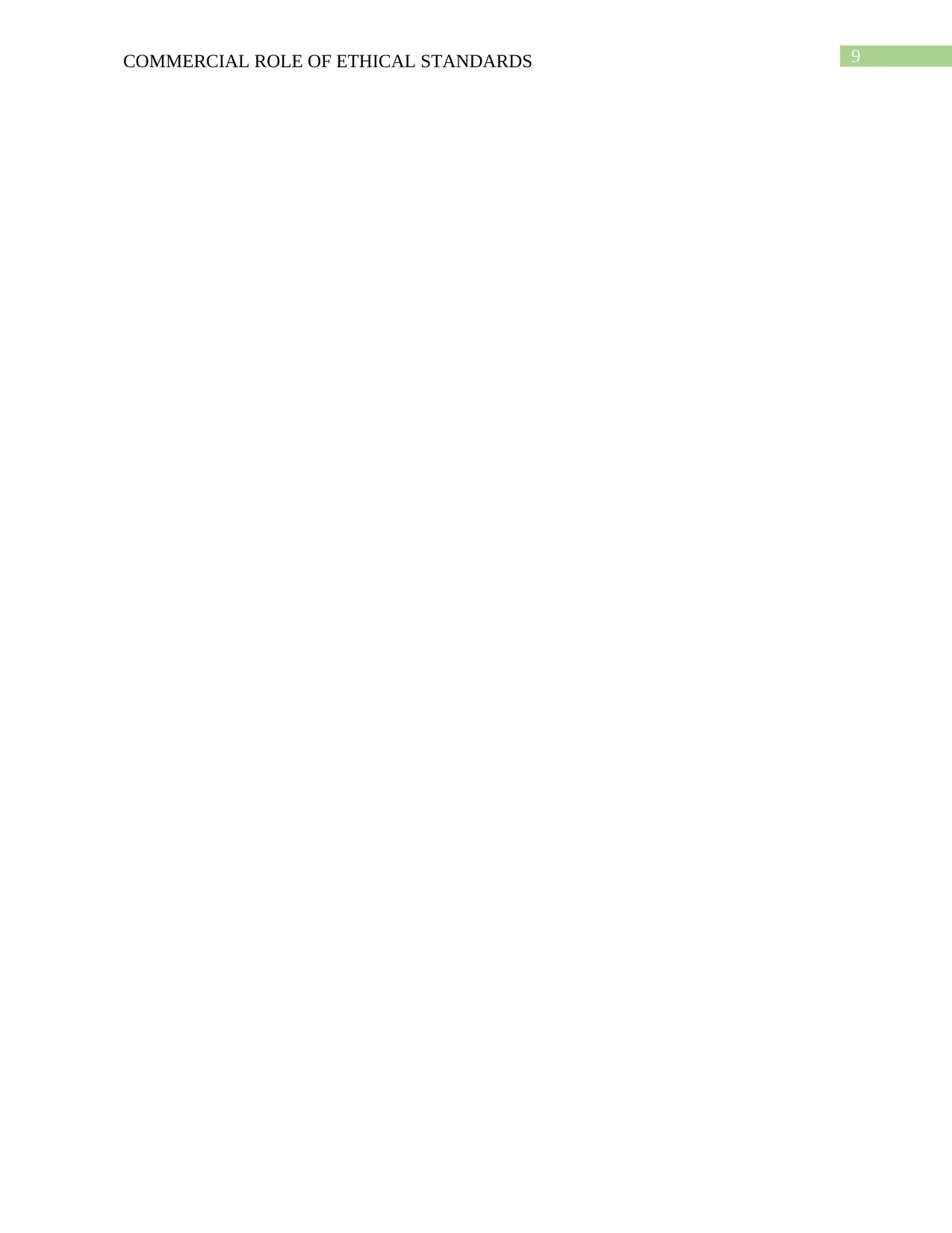
9COMMERCIAL ROLE OF ETHICAL STANDARDS
1 out of 10
Related Documents
Your All-in-One AI-Powered Toolkit for Academic Success.
+13062052269
info@desklib.com
Available 24*7 on WhatsApp / Email
![[object Object]](/_next/static/media/star-bottom.7253800d.svg)
Unlock your academic potential
Copyright © 2020–2026 A2Z Services. All Rights Reserved. Developed and managed by ZUCOL.




